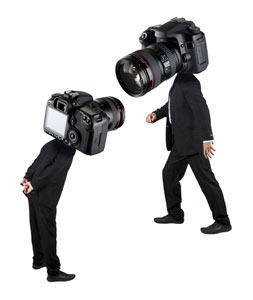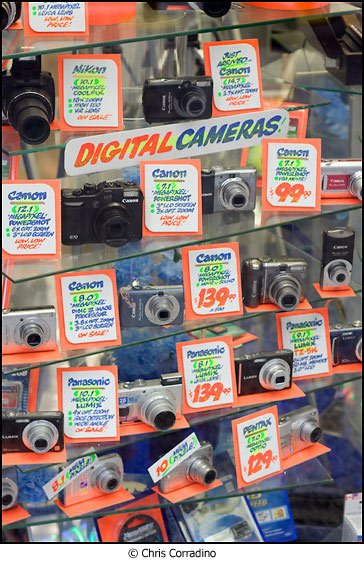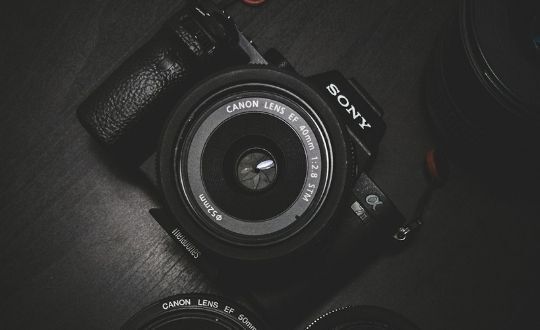Warning: the following article is likely to cause a bit of discussion, but Chris is a serious photographer and teacher, and he calls them as he sees them. In addition to the camera company's need to sell more and more cameras, and the magazines and blogs breathless attention to every little improvement, we have to bear in mind that we, America's consumers, are the third side of this triangle.
Bear in mind, as we say at NYIP: "It's not the violin, it's the violinist. Comments are always welcome and appreciated. Send them to This email address is being protected from spambots. You need JavaScript enabled to view it. .
There is a fine line between the need for new gear, and succumbing to marketing hype. If the following scenario sounds familiar, don't worry, you are not alone. A new camera is released and it has 3 more megapixels than your current body plus a few new features you may or may not use. You go online to your favorite photography forum and dozens of members claim to have placed their pre-order already. They boast that this will be light years ahead of the model you currently own. The phrase "game changer" is tossed around liberally. In scanning a few threads, the popular sentiment seems to indicate that all previous models have become worthless overnight.

You check the well-known blogs and sure enough, they have already been using the new test model for several months now. Of course they also claim it to be the hottest, fastest, smartest, feature-rich camera they've ever seen. Discouraged, you log off and watch some TV only to be disrupted by the mailman. Your latest issue of xxx photography magazine has arrived and much to your surprise, the cover is a frame-filling photo of the new two thousand dollar camera. The headline proclaims it to be the next big gun — you just have to buy this camera if you want to shoot like the pros. You flip to the inside article but the text is identical to the press release from the camera manufacturer. It's nothing but an ad disguised as an article. You know there is nothing really wrong with your current camera, but you don't want to be left behind. Defeated, you log back online and charge the next best thing to your credit card. You hide it from your spouse as deep down you know it really wasn't necessary.
The camera is delivered and you test it out. The first thing you notice is that your memory cards fill up much faster. You make a mental note, "need bigger memory cards". When you get home and download the images you realize the files take up more space on your hard drive. Another mental note, "need new computer". Your shiny new camera sits beside you as you log back on and resume shopping. Six months later you finally finish paying off the credit card bill. You are about to lace up your hiking boots and grab your camera, but decide to check your email first. There in your inbox is a message from your friendly camera store. Your heart sinks as you begin to read. Your new camera is already old news. The next best model has just been announced and promises to be better than anything you can imagine! You slump in your chair and start researching the new camera. Suddenly you don't feel much like hiking after all.

Thankfully there are some simple ways to avoid this vicious cycle. First, if your favorite blogger raves about a new camera but is also conveniently featured in advertisements from the same manufacturer, do yourself a favor and unsubscribe from that feed or newsletter right now. There's a good chance that the blogger is being paid to sell you something and does not have your best interests in mind. Next, un-bookmark those forums that are filled with rumors and speculation about the next dream camera. Then, write to the editors of the photography magazine you subscribe to and let them know you want more information on how to take better pictures, and fewer advertisements disguised as articles. Once you've eliminated these distractions, you can spend your time mastering every aspect of your camera.
Upgrades should only be done when you are technically limited by your current model. Instead of purchasing every new camera, wait for every third model. This will work out to roughly every three years. Use the savings to visit a nearby State or National park. This is where you will really get a chance to better your portfolio. Only by spending your time and energy on photography will you truly improve. Just as a new guitar won't turn an aspiring musician into Jimmy Page, no camera can transform you into the next Ansel Adams.
For inspiration, check out this article about Alex Majoli, an award-winning photographer who achieved great results using two pocket sized point-and-shoot cameras to photograph conflict abroad. Study the work made by Henri Cartier-Bresson, who primarily used one camera and lens during his long and prolific career. Consider this quote by photographer Ernst Haas who said, "the limitations in your photography are in yourself, for what we see is what we are."
The next time you come across a glowing review of the latest "must-have camera", let the masses flock to it like sheep. While they are busy testing ISO noise levels with charts and debating the merits of autofocus systems, you can get back to what's really important: taking pictures.
Choosing the right gear to work with is crucial. Buying the right camera even more so. Learn everything you need to with NYIP's photography courses.






